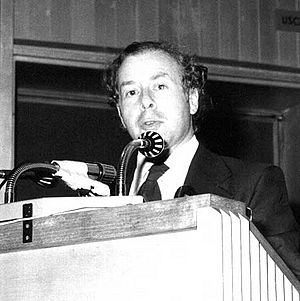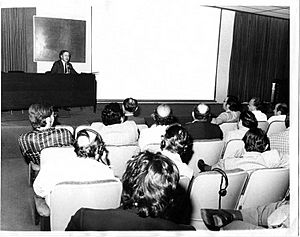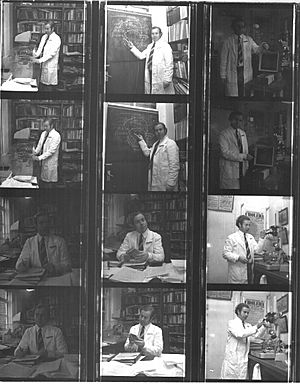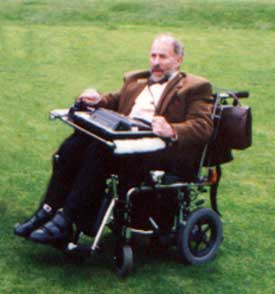Sydney Selwyn facts for kids
Quick facts for kids
Sydney Selwyn
|
|
|---|---|

Selwyn presenting a lecture in Italy in the early 1980s
|
|
| Born | 7 November 1934 Leeds, England
|
| Died | 8 November 1996 (aged 62) London
|
| Nationality | British |
| Alma mater | University of Edinburgh, University of Edinburgh Medical School |
Sydney Selwyn (born November 7, 1934 – died November 8, 1996) was a smart British doctor, scientist, and professor. He was a medical microbiologist, which means he studied tiny living things like bacteria. He also loved history, especially the history of medicine. Sydney Selwyn was a great writer, lecturer, and even appeared on TV and radio. He traveled all over the world!
Contents
Sydney Selwyn's Early Life and Education
Sydney Selwyn was born in Leeds, England, on November 7, 1934. He passed away in London on November 8, 1996.
His parents owned a butcher shop in Leeds. They hoped he would join the family business. But Sydney chose a different path, wanting to focus on science and learning.
Growing up during World War II in the 1930s, it was a big deal for him to win a scholarship. This allowed him to study at the famous and old Leeds Grammar School. After that, he went to the University of Edinburgh. There, he earned several degrees, including one in hospital infections.
Sydney Selwyn's Medical Career
Sydney Selwyn worked as a doctor in Edinburgh from 1959 to 1960. Then, he became a teacher of bacteriology at the University of Edinburgh Medical School.
In 1967, he became one of the youngest visiting professors for the World Health Organization (WHO). He worked at Baroda University in India. He also served as a WHO medical consultant for Southeast Asia.
He traveled widely across India, visiting many hospitals. His goal was to improve health and hygiene standards. After returning from India, he became a professor of Medical Microbiology at Westminster Hospital Medical School, part of the University of London.
Later, he also became a professor at Charing Cross Hospital Medical School. This meant he managed two different departments at two teaching hospitals at the same time!
Pioneering Bone Marrow Transplants
In the 1970s and 1980s, Professor Selwyn was a leader in bone marrow transplants. This is a special medical procedure that helps people with certain diseases. He was involved in treating two important cases: Simon Bostic and Anthony Nolan. Anthony Nolan's mother later started a charity called the Anthony Nolan Trust.
Expert in Medical History
Besides his research, Sydney Selwyn became an expert in the history of medicine. He knew about medicine from ancient times to his own day. He was also a very popular speaker on this topic.
He held many important positions, like being the honorary archivist for the Royal College of Pathologists. He also led a popular course called the Diploma of the History of Medicine. Students even flew in from other countries to attend his classes! He made this course very popular for 17 years until he retired due to health issues in 1990.
Sydney Selwyn as a Writer
Sydney Selwyn wrote and co-wrote many books and scientific papers. One of his easy-to-read books was about antibiotics, which are medicines that fight bacteria. It was called "The beta-lactam antibiotics: penicillins and cephalosporins in perspective."
Designing a Banknote
Sydney Selwyn had many interests, which led him to unusual projects. For example, the Bank of England asked him for ideas for a new £10 banknote. He suggested featuring Florence Nightingale, a famous nurse.
He even recommended a classic picture of her carrying her lamp. This image earned her the nickname "The Lady with the Lamp" during the Crimean War. When the Bank of England couldn't find the original picture, he lent them a rare copy from his own collection.
The Florence Nightingale £10 banknote was first released in February 1975. It was very popular and was used until May 1994.
Sydney Selwyn's Broadcasts
Sydney Selwyn gave some popular radio talks about the dangers of licking postage stamps. Some stamps used glue made from animal bones, which could carry diseases. Because of this, companies making self-adhesive stamps asked for his advice. He even helped develop self-adhesive stamps for Gibraltar.
He also appeared on TV as a medical expert. In the 1970s, he was interviewed on the BBC show "Nationwide." He explained that many people used too many chemical cosmetics. He said this could harm our skin's natural balance. He suggested that simple soap and clean water were usually enough. He believed many advertised products were unnecessary and could even be harmful if used too much.
He also worked with the BBC on documentaries like "Horizon" and "Microbes and Men" (1974).
Sydney Selwyn's Later Years and Illness
When Professor Selwyn was in his 50s, he was diagnosed with a condition called "multiple system atrophy" (MSA). Doctors told him he might only have a few years left. Even after he had to retire early, he kept writing, publishing, and traveling.
Despite his health getting worse, he kept his dignity and sense of humor. He refused to stop moving around. He learned to drive a new electric wheelchair. When he lost the ability to speak, he learned to communicate by typing one letter at a time on a special device called a lightwriter. This device had a built-in voice that spoke for him.
He celebrated his 62nd birthday with his family. He was full of excitement and humor, even though it was hard for him to express it. He passed away peacefully at home the next day.
Remembering Sydney Selwyn
There are several ways Sydney Selwyn is remembered:
The Sydney Selwyn Room
A room at the Charing Cross Hospital in London is named "The Sydney Selwyn Room." It is used for meetings and teaching. His photo and a plaque explaining his contributions are on the wall.
The Selwyn Prize
Each year, "The Selwyn Prize" is given to the best student in a special exam. This exam is for a diploma in the Ethics and Philosophy of Healthcare. Winning this prize is a great achievement because the students are usually very good.
The winner of the 2021 Sydney Selwyn Lecture was Dr Lotte Elton. Dr Deniz Kaya and Dr Andrew Nanapragasam were also highly praised.
Previous prize winners include:
- 2020 - Dr Mary Fletcher
- 2019 - Dr Sara Dahlen
- 2018 - Dr Tina Matthews
- 2016 - Daniel Di Francesco
- 2012 - Miss Evelyn Brown
- 2010 - Dr Margaret Baker
- 2009 – Christopher Mark Crawshaw
- 2008 – Dr. Katherine Elen Catford
- 2007 – Michael Trent Herdman
- 2006 – Paul Bingham & Edith Rom
- 2005 – Caroline Bagley & Ben Whitelaw
- 2004 – Robert Ali
See also
- MSA (Multiple System Atrophy)
 | Janet Taylor Pickett |
 | Synthia Saint James |
 | Howardena Pindell |
 | Faith Ringgold |




